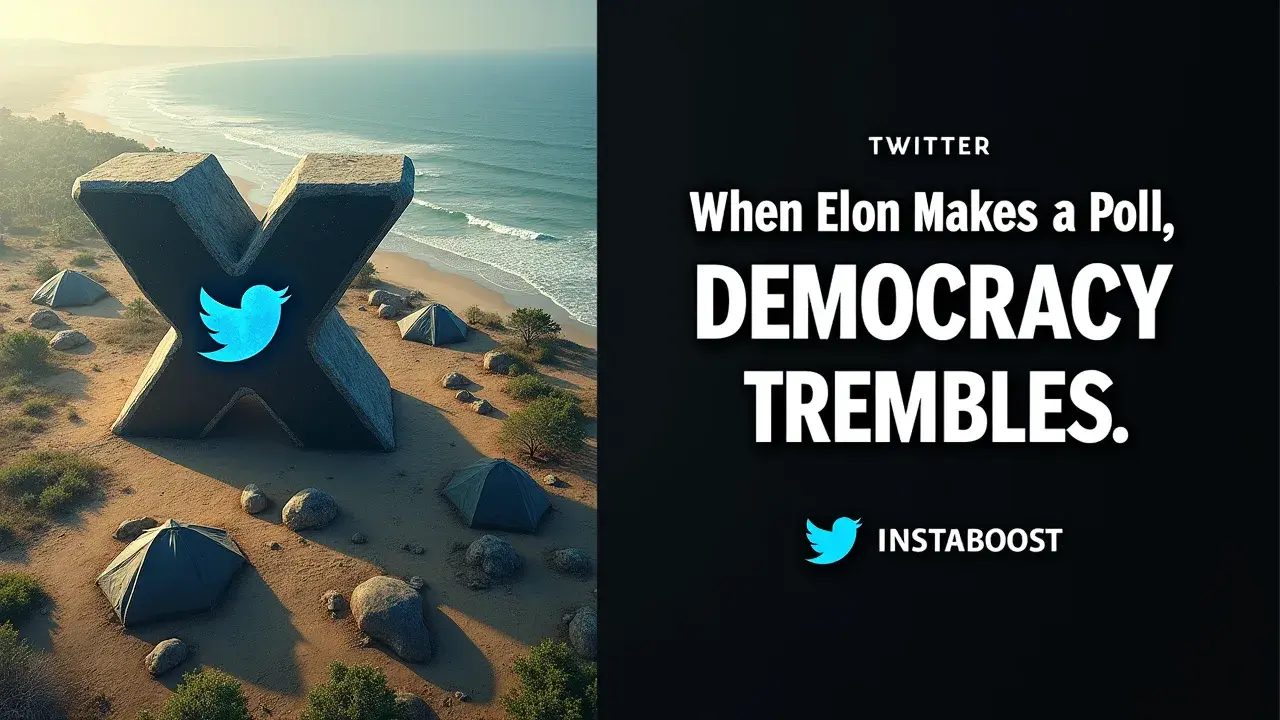Twitter: Do Elon Musk’s Polls Make Democracy Tremble?
Musk’s Twitter polls can unsettle expectations about how influence works online. They invite mass participation yet blur rigor, mixing impulsive votes with strategic brigading that changes outcomes and the surrounding narrative. This tension fuels argument and confusion while reframing what counts as public input on the platform. Treating such polls as directional sentiment rather than binding decisions offers a clearer path to interpreting their impact.
The Poll Button at the Center of Power
It’s strange how much weight something like Twitter polls can carry, especially when Elon Musk is the one running them. What was designed as a simple way for people to cast a quick vote or share an opinion – like picking your favorite color – has, in Musk’s hands, started to mean a lot more.
When he asks followers about bringing back suspended accounts or making decisions at one of his companies, it can set off real shifts: stock prices move, news cycles change, and people start arguing about these polls in the context of actual politics. It's almost unsettling to realize that a single person with a phone and a huge following can trigger those kinds of reactions.
When he asks followers about bringing back suspended accounts or making decisions at one of his companies, it can set off real shifts: stock prices move, news cycles change, and people start arguing about these polls in the context of actual politics. It's almost unsettling to realize that a single person with a phone and a huge following can trigger those kinds of reactions.
It makes the lines between an internet poll, business strategy, and what we think of as public participation feel blurry. There’s a real question here about whether these polls are lightweight ways to get people involved or if they actually reveal something unsteady about how decision-making works online – especially when the person running the poll has so much influence to begin with.
As places like Twitter become bigger stages for these kinds of power plays, who gets to be part of it – and who really holds the cards – starts to matter more than it used to. For anyone using Twitter, whether it’s to pass the time, keep up with the news, or even try to grow a following with things like INSTABOOST or Twitter growth packages, knowing how this all works is starting to become important in a way that’s easy to miss at first.
As places like Twitter become bigger stages for these kinds of power plays, who gets to be part of it – and who really holds the cards – starts to matter more than it used to. For anyone using Twitter, whether it’s to pass the time, keep up with the news, or even try to grow a following with things like INSTABOOST or Twitter growth packages, knowing how this all works is starting to become important in a way that’s easy to miss at first.

Why Twitter Polls Aren’t Real Democracy
I’ve heard this explanation from a lot of different teams, and it’s never been convincing. People will say, “Elon’s only asking for feedback. If you don’t like what comes out of the poll, ignore it – it’s just Twitter.” But that doesn’t really hold up if you look at how much influence Musk’s polls actually have.
With the size of his following and the amount of attention he gets, his polls aren’t just some harmless way to stir up conversation. When the person who owns Twitter runs a public poll, it’s not the same as a marketing team trying to get more clicks; the results end up everywhere. Journalists pick them up, investors pay attention, and sometimes even policy discussions get shaped by whatever comes out of these votes. The bigger problem is that Twitter’s polls aren’t transparent – you can’t see who voted, there’s no verification, and bots can take over without much effort. If someone suggested running a real election this way, nobody would accept it, but somehow when it happens on social media, people treat it as if it matters, just because there’s a big name attached to it.
And it’s not just about celebrity – sometimes, even something as basic as a followers pack for X can quietly change the perceived weight of a poll or a conversation. That says something about how easy it is for social media to turn spectacle into something people treat as real. A single poll on Twitter can end up swaying the way people talk about an issue, or even how markets move, even though it’s missing all the safeguards we’d expect in any actual decision-making process.
Strategy Is People, Not Just Polls
A lot of strategies run into trouble because they don’t really think about the people involved. That’s the main problem with relying on Twitter polls for big decisions – especially when Elon Musk is in charge of them. He likes to frame it as letting everyone have a say, but Twitter users aren’t a stand-in for the general public.
Most of the time, the people who end up shaping the outcome are the ones who are the loudest or most fired up in that moment. Whether you’re running a company or something as big as Twitter, you can’t base your plans entirely on what gets the most immediate reaction. You have to look at who’s actually voting, what’s pushing them to take part, and what other pressures or biases might be in play. Sometimes, the same kind of skewed motivation that leads people to get Twitter post likes can drive them to participate in polls, so the results might not be as representative as they seem. Reducing complicated choices to an online poll means you’re likely handing important decisions to a pretty small – and sometimes extreme – slice of people, and those results can spill over to affect millions, including folks who never use Twitter.
That’s the part of Musk’s “digital democracy” idea that doesn’t really hold up. It might feel straightforward to trust a poll, but real decisions need more than a yes or no. Good strategy means asking who benefits, who might lose out, and what all this could mean down the line. Leaders who think about these things know that democracy isn’t about counting responses on a screen – it’s about actually listening and building some trust, even when there isn’t a lot of noise. Sometimes, that’s the hard part.
The Illusion of Choice in Social Platforms
There are times when following the so-called right process doesn’t really feel much different from doing things the wrong way. For instance, look at the way Elon Musk uses Twitter polls. On the surface, it looks like everyone gets a vote and the majority decides – that’s what we’re told democracy is supposed to be.
But if you look at how those polls actually work, it’s not really that straightforward. The people who spend hours on Twitter, or who are most eager to make noise, usually have the biggest influence. Instead of giving space for real conversation or thoughtful debate, these polls tend to reward whoever responds the fastest or manages to draw the most attention.
And Twitter itself isn’t some random cross-section of society – it’s mostly people who have chosen to be there, along with bots, die-hard fans, and an algorithm that pushes whatever gets the most reaction. If someone wants to mess with the results, there’s not much stopping them – especially when things like bulk views for Twitter are just a click away. It’s hard to know if the final numbers show what people actually think, or if it’s mostly the outcome of a handful of groups coordinating behind the scenes. There’s something appealing about the idea of asking the public what they want, but Twitter makes it hard to tell where real participation ends and performance begins.
Even when Musk says he’s leaving decisions up to the people, he’s still the one deciding what gets asked and when. These polls can feel important when you see them pop up, but it’s hard to shake the feeling that they’re more about appearances than about actually letting people decide. It makes me wonder who really gets heard, and how much of it is just part of the platform’s usual routine.
Spectacle Over Substance: What Twitter Polls Reveal About Influence
When Elon Musk runs one of his Twitter polls, it rarely seems like a real attempt to learn from people or gather honest feedback. It comes across more like a performance, where the act of voting is turned into entertainment and the outcome is less about group decision-making than about keeping attention on what he’ll do next. These online polls do have a certain energy, especially when the questions are big – like whether he should step down as CEO, or bring back a banned account. It’s no wonder people look for ways to amplify their opinions, sometimes even using services like order tweet shares to boost visibility.
But looking at the polls themselves, I get the sense they’re meant more to draw in viewers and spark reactions than to actually listen or build agreement. With Musk, these polls don’t really reflect what people want; they feel more like an extension of how he runs things, blending leadership with a kind of showmanship. What stands out to me is that voting in these fast online polls doesn’t do much for democracy. If anything, it shows how someone with a platform can shape the conversation and avoid being held to real choices. It’s easy to feel involved when you’re clicking “yes” or “no,” but the person in charge still has all the control. In a space where quick decisions and viral moments are the norm, it’s hard to tell if any of it actually adds up to something meaningful, or if it’s just more noise.




